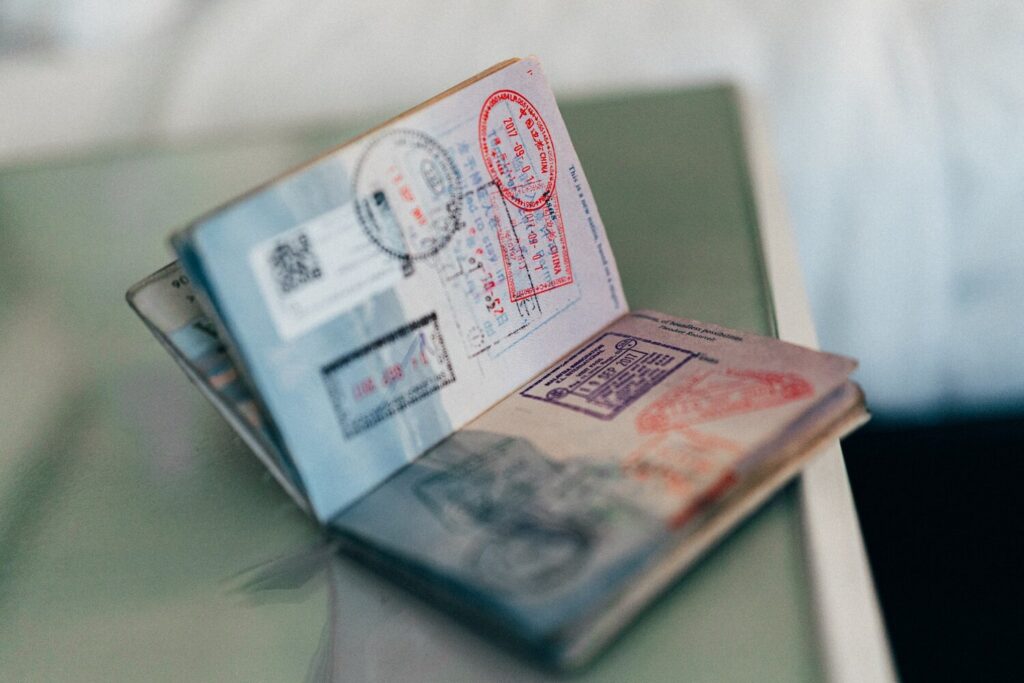
How to Become a Digital Nomad
You’ve seen the TikTok’s, the Instagram posts, the articles.
Seemingly normal people traveling around the world, full-time, while making money from their laptops.
The pictures usually include a Bali villa or a table overlooking the Amalfi Coast in Italy or perhaps a thought-provoking photo of said Digital Nomad posed in front of their laptop.
It’s incredible, you think to yourself.
I want to do that, a still, smaller voice whispers.
So, you browse the internet looking for how to become a digital nomad and travel the world so that you too can live the dream life. However, all you find are people wanting to sell their thousand-dollar courses or their memoirs or their products while claiming that the said product is a sure-fire way to start living the dream life. You can smell the scam from a mile away.
Don’t worry, we’ve all been there.
It seems with the explosion of a new social media platform (TikTok has amassed a whopping 1 billion users as of 2022) and a Great Resignation, there is now, more than ever, a push to move into the world of working from your laptop.
From the 16-year-old influencer making millions every year to freelancers taking the corporate world by storm, the world is changing, and it’s changing quickly.
And you still are struggling to find out how you can become a part of this new world as a digital nomad. Well, look no further.
This article is a comprehensive guide to how you can become a digital nomad with no experience. (And no, it doesn’t involve dancing in front of your phone.)
Written, researched, and fact-checked by a digital nomad herself, this article will be the ultimate tool to help you start on your journey to freedom as someone who can work from anywhere in the world.
Let’s begin.
What is a Digital Nomad? (Or Digital Nomad Definition)
First of all, let’s define what a Digital Nomad is.
Although you can’t paint all digital nomads with the same brush, at their core they all are remote workers who utilize modern devices and Wi-Fi to work while they travel. A digital nomad may work with a company, for themselves, or as a freelancer part of a larger collective.
But there is one key similarity – they all work remotely. Meaning that they are not obligated to show up to an office or workspace.
Instead, they utilize technology to connect them to their clients and companies. Whether that includes a laptop or an iPad or a smartphone is entirely up to the digital nomad and what they need to complete their work. This allows digital nomads to have the freedom to travel wherever they’d like while still making a full time income.
This is where the ‘nomad’ part of the digital nomad title comes in – you travel while you work or you work while you travel.
What do Nomads do and How can I become a Digital Nomad?
It’s hard to pin down what the day-to-day of a digital nomad looks like as job requirements, location specifics, and schedules aren’t written in stone. However, you can usually count on putting in a couple of hours of work before going off on a new adventure in your destination.
Whether staying in a luxe villa in Italy, a campervan along the west coast of the United States, or renting out Airbnb’s in Mexico, digital nomads have to make a living and so must put in at least a couple of hours of work in at least.
A general daily schedule for a digital nomad may look like the following:
- Wake up whenever you’d like (depending on if you have any meetings or scheduled activities)
- Put in a few hours of work in whatever capacity that looks like
- Go about your day + explore the place you’re in
- Wind down and maybe put in another couple hours of work
Because all you need to work is your modern device (laptop, iPad, smartphone, etc.) and a Wi-Fi connection you can bring your work with you wherever you go. A freelance writer to a café, a virtual assistant to the poolside, a YouTuber to camel riding in the desert – there is no right or wrong way to be a digital nomad.
Digital Nomad Careers
The fields in which digital nomads work are as diverse as the people themselves.
Digital nomads can be consultants for a tech company, virtual assistants for an upstart, or freelance writers for websites. Any job that can be transitioned into remote work can be a digital nomad’s job.
That being said, there are a few rules when it comes to what work you can take with you around the world.
Why not all Careers can be Digital Nomad Careers
Even if your job was moved into a working-from-home position during the pandemic, it doesn’t mean that it is a job that you can do remotely from different countries around the world.
There are laws that companies must abide in as well as regulations that control where a company sources their work from and where their workers live.
This is for many reasons, namely tax considerations, certifications, and time zone differences. The regulations change state to state and country to county, so having a team composed solely of location-independent workers is tough to coordinate and manage.
So, if you’re in a work-from-home job, it’s best to check in on the location requirements for that specific job and company before you start packing your bags.
However, there are plenty of careers that don’t require you to stay in a specific location.
Possible Careers as a Digital Nomad
Please note that this list is nowhere near exhaustive.
Writing + Translation:
Copywriting, Content Writing, Blogger, Article Writer, SEO Specialist, Article Re-writer, Editor, Book Editor, Scriptwriting, Language Teacher, Ad Copy, Creative Writing.
Digital nomads working in Writing + Translation are usually either freelancers or are hired by companies to be remote in-house writers.
Virtual Assistant:
A Virtual Assistant completes small, daily tasks for a company remotely.
Social Media Manager:
Manage and create content for brands and companies. With the rise of TikTok, this job is becoming increasingly more common and sought-after.
E-commerce:
Managing your online store through Shopify or Amazon without personally carrying the products. This requires a bit more investment to start up, but once you get going you can passively make income.
Graphics + Design:
Brand packaging, logo design, graphics, web/app design, social media design.
This sphere of work is expansive and you can easily freelance as a Graphics Designer. Although, this may require a bit more equipment to have with you.
Tech:
Website development, website programming, mobile app development, NFT development, website building, coding.
Although starting in Tech usually requires a bit of schooling beforehand, unless you freelance, it’s a big payoff as Tech is one of the fastest-growing industries today.
Marketing:
You work with a company to promote their products and services using tools such as social media and email copy.
Influencer:
Although this requires a lot of forethought and effort, becoming an influencer for a specific niche you have an interest in is a way to become a digital nomad.
Influencers usually work with brands to promote products to their audience.
Content Creator:
YouTuber, TikTok, entertainer, etc.
A Content Creator is different from an influencer as you strive to produce quality, entertaining, or educational content for your followers.
As a content creator, you can make income through brand deals and sponsorships, much like an influencer.
There is a near endless list of possible job and career options for digital nomads. As the world pushes to move online, the number of Digital Nomad jobs being location independent has grown exponentially in the last decade alone.
But before you give your two weeks and pack your bags, you need to establish a solid income stream (or two, or three – but we’ll get into that later) online before you leave.
One of the best things about becoming a digital nomad is that depending on the field you want to work in, you don’t need a college education or any previous experience.
The only thing you need is to start.
How to Become a Digital Nomad with No Experience
There are several different paths to take towards becoming a digital nomad. Most of them require no experience beforehand.
Some of the ways you can become a digital nomad and start traveling the world are:
Freelancing
If you are skilled at a hobby or an interest, you can likely translate that skill/interest into an income source. Whether writing or marketing or social media, there are a lot of companies looking to hire freelancers to produce content for them or complete a job.
If you’re not sure how to build a portfolio or get clients or how to begin, some sites will help you get started as a Freelancer. These websites are freelancing platforms that connect freelancers and clients and offer a system in place to protect both during transactions.
Fiverr, Upwork, and LinkedIn are the largest freelancing platform sites out there to date and are perfect for getting started in the world as a freelancer.
Another way you can start freelancing is to start up a freelancing business for yourself.
However, if you’re a beginner in this type of work, we highly recommend learning the tricks of the trade through the sites mentioned above. This allows you to become more confident in freelancing which will only benefit you later if you decide to open up your own freelancing business.
Transitioning your current position into a remote working role
If there is anything that the pandemic has proven, it’s that many jobs can be done remotely.
Whether or not your role has already been shifted into a working-from-home position, it’s worth asking your supervisors whether or not a location-independent role is possible for your job.
This option is great for remote bookkeepers, accountants, programmers, etc., as this process is uniquely shaped for your role. Especially if you’re not in a lot of meetings and self-supervise. A lot of digital nomads begin here before they shift into a different career.
Again, working-from-home does not equate to a location-independent job because of laws and regulations the company you work for must abide by. So, before you begin planning a year-long stint abroad, meet with your upper management to see if anything is stopping you from becoming a solely remote worker.
Even if you’re skeptical, it’s worth a shot. You never know what the company has allowances for. Sometimes it is possible with a slight shift in responsibility and roles, so if you’re willing to change your official role in the company then all the better.
Starting a Business
This one lands between the Freelancing and role shifting options mentioned above and is a popular route for many digital nomads.
If you’re looking for freedom beyond just freedom of mobility, then starting a business that you can manage remotely may be the best bet for you. Business ownership for a digital nomad looks different than owning a brick-and-mortar shop; owning a business can look like an E-commerce shop, social media management, copywriting business, etc. The possibilities for this are endless.
With the world’s content mainly based online or through technology, many businesses operate mainly online and you can operate a U.S based company from your Airbnb in Nice, France. Of course, with owning a business you need to take taxes into account, which we go through later in the article.
One of the greatest gifts of the shift to an online world is that you can hire a team of professionals from your laptop and have them run your business, effectively converting your business into a passive income stream (income that you don’t need to actively work for).
Becoming an Influencer/Content Creator/YouTuber
If you’re not afraid of the camera, then becoming an influencer or content creator is a viable path to becoming a digital nomad.
Although the word influencer and content creator may evoke images of doing TikTok dances or maintaining an unrealistic body image, there are far more streams of online personalities than what is often associated with the word.
You can provide a service, be a lifestyle influencer, or you can produce educational content in a certain niche. The areas to work in are endless and diverse. Once you’ve gathered a following, you can start reaching out to brands for sponsorships and deals, or you can produce courses and books to sell.
The perfect niche to get into as an influencer/content creator/YouTuber as a digital nomad? Travel.
That way your travels become a part of your job and can even be written off as a business expense (depending on your area’s tax laws etc.) if your travel is business-related.
So, how can I really become a Digital Nomad?
When traveling you don’t want to be putting in 8-hour days 5 days a week.
Travel is unpredictable and you won’t always have access to a stable Wi-Fi connection or power source.
During travel days especially, when you’re moving from location to location it can be hard to get a couple of hours of work in between flights, transfers, managing accommodations, and getting settled in.
This is important to consider when thinking about what you want to do for your income source as a digital nomad. There are a couple of ways to combat a usual 40-hour week that will allow you to enjoy your travel while working.
Below are the two main income hacks used by digital nomads, no matter what area they work in.
Having multiple income streams as a digital nomad
Having multiple income streams is one of the most important hacks when it comes to being a digital nomad. Not only does having multiple income streams exponentially increase your earning potential, but it also ensures a steady income stream.
Having multiple income streams means that you have more than one source/business/job that you make income through. So, instead of choosing only one of the above options for becoming a digital nomad, choose a couple.
That could mean starting an E-commerce site while you freelance on the side, or you work as a virtual assistant for a company or person while running an influencer TikTok account.
The smartest way to ensure that you can travel comfortably and build up a retirement fund is to have multiple streams of income.
Creating Passive Income Streams
Another big hack? Make one or more of those streams of income passive, meaning you don’t need to actively put in work to make money from that income source. This seems fantastical if you don’t know much about passive income, but it’s completely doable.
A couple of examples of passive income streams are:
- eBooks – you write it once then profit off the sales for years to come
- Courses – you can create a course about your niche or something you’re good at and sell it to make a profit
- Low content publishing – A popular choice is to create notebooks on Canva and sell them on KDP through Amazon
- Affiliate Marketing – You funnel internet traffic to a specific product that when bought, you receive a commission for. Almost all websites have affiliate programs (Amazon, Walmart, etc.)
- Investments – You can invest in stocks, mutual funds, crypto, and receive money off of dividends. However, this option requires a lot more forethought, effort, and money.
Many, if not all, digital nomads utilize both multiple income streams as well as passive income to help fund their travels. This creates a sense of security as you have a safety net to fall back on should anything happen.
Plus, setting up multiple income streams and passive income streams frees up your day to explore more. Of course, it is recommended that you have these in place before you begin traveling so you’re not dealing with the stress of traveling alongside starting up income streams.
Logistics of being a Digital Nomad
There are some factors to consider that go beyond just picking your favorite destination and making a career change so you can become a digital nomad.
When you become location independent, there’s some important ground to cover in what the logistics of a nomadic life looks like from taxes, to packages, to banking.
Taxes for Digital Nomads
Tax season looks different depending on where your citizenship is, what you do for work, and how much money you make.
If you own a business or are a freelancer, then a general rule of thumb is to save 30% of your earnings for taxes. But you also get to write off some travel expenses as a business owner which helps lower how much income you claim at the end of the year.
If you’re a business owner/freelancer and your business makes over a certain amount (changes country to country) you may have to charge additional GST taxes for your client.
Depending on where you start your business, the tax you pay changes as well. It all gets pretty complicated and confusing, so we recommend hiring an accountant that specializes in taxes for people living overseas to ensure that you’re filing away correctly each year. The same goes if you are working for a company remotely.
Banking Options as a Digital Nomad
Banking becomes considerably more complicated when you’re bouncing from one country to the next. From card blocking to receiving your pay while overseas, you need to put some forethought into which bank you choose.
Some options are specifically geared towards digital nomads such as Wise, Paypal, and Payoneer.
One thing you’ll want for sure is a travel credit card. These cards allow you to collect special points or Airmiles which can be redeemed for flights and accommodation bookings.
Plus, credit cards have more security than a bank card does and offer more when it comes to travel.
Savings + Retirement as a Digital Nomad
You must be smart with your money while traveling.
Ensuring that you have emergency savings for emergency healthcare, plane tickets, accommodations, etc., is a must. You never know what can happen while abroad and you don’t want to get stuck somewhere in case of an emergency (like a global pandemic).
As for retirement funds, the money you save by living in a country with a lower living cost should be funneled into various investment and retirement accounts. The accounts available to you, of course, depend on where your citizenship is. But it is very much worth looking into.
Mail + Packages and how to Receive Them as a Digital Nomad
A way to avoid the issue of receiving mail while you’re constantly on the move is to move your mail online. Many places, whether banks, insurance, or magazine subscriptions, all have online options. Opting to receive your mail online is the best way to receive your mail.
As for packages, you can sign up for a digital package service that will temporarily give you a physical address through which you can receive your packages.
Health Insurance for Digital Nomads
You need to be prepared in case anything goes awry during your travels. If an accident or emergency occurs while you’re abroad, Digital Nomad travel health insurance will cover any medical costs, transportation costs, and even costs associated with health advocates (translators, etc.).
This is important for digital nomads, especially when you’re halfway across the world from your home country.
There are many options to choose from when it comes to health insurance for digital nomads – SafetyWing, World Nomads, and Cigna global to name a few.
Visas for Digital Nomads
One big logistic you have to ensure you thoroughly familiarize yourself with are Visas. Gone are the days when you can simply pick up and go to a country Willy-Nilly like the old explorers of the day.
Today you have to abide by international law and agreements posed between countries. Visas are permits that allow you to travel, work, or live in a country that is not your own.
There are extensive requirements needed for them and these requirements change depending on where your passport is from and what country you are applying to get into.
Visas are especially needed if you plan on getting a job in the country you are going to. These are called work visas.
However, if you are a freelancer, there is one way around the often-long and arduous process of visas: knowing how long you can stay in a country without a visa and then moving to a different country before the time is up.
For example: a Canadian can legally stay and visit in the U.K for up to 6 months without a visa.
So, a Canadian digital nomad may go to London, England for 6 months before moving to a country in the Schengen area where they can stay for up to 3 months. Then after 3 months, they move to a different country. And so forth.
Visas can get complicated, but they are a necessary evil when it comes to being a digital nomad.
Where to stay as a Digital Nomad
This changes from person to person because of several factors: preference, work requirements, budget are the big three to take into consideration.
But before we get into all of that let’s list the most popular countries to stay in as a digital nomad:
- Thailand
- Indonesia
- Sri Lanka
- Mexico
- Spain
- Portugal
You’ll notice in the list that a lot of these countries have a low cost of living which makes them extremely appealing to digital nomads. However, a big bonus that attracts a lot of digital nomads to these countries is specialized visas and even promotions that these countries offer to digital nomads that sweeten the deal just a little bit more.
Now, when you’re in a country there are a couple of options you can do for accommodations.
Hostels – these co-living spaces are ideal for budget digital nomads and younger people who are looking to meet people and have fun.
Airbnb’s – this is a great option for month-to-month stays in a country and for those looking for somewhere to have to themselves while traveling.
Renting – This option makes sense for those who are looking to stay in a country for three months or longer. Renting an apartment, villa, house through a rental site will save you money for long-term travel.
The Pros of Being a Digital Nomad
If you’re still on the fence on whether or not you want to become a digital nomad, then here are a few of the benefits of being location independent:
Travel
This is perhaps the biggest perk of being a digital nomad. Because you can earn a living off of your laptop and a Wi-Fi connection, the possibilities of where to go are endless. You can decide which country or city you’d like to live in, and you can stay there for as long as you want.
The world opens up to you and the benefits of travel are too numerous to count.
Control Over Your Time
Although you may be contractually obligated to attend a meeting or two, for the most part, remote workers are in charge of their schedule and time. This control of time is a luxury in a world where we are taught to trade our time for money.
Being able to decide when you work, how long you work, and where you work allows you to live the life you want on your terms.
Save Money on Living Costs
Yes. You read that right. Traveling full-time is different from vacation, so don’t use the $3,000 you spent on last year’s vacation cloud how much you think being a digital nomad costs.
Being location independent means, you get to choose where you live and travel, so you can choose a country with a significantly lower cost of living than your home country, and end up saving a lot of money. Plus, long-term travel is cheaper than living in your home city, especially if you choose the right country.
For example: A beautiful villa in Bali with a pool costs anywhere from $400 – $800 a month to rent for yourself.
Food costs add up to less than $100 if you buy groceries. Transportation can be free (if you prefer walking) or cost around the same as food. All of this being, of course, in the gorgeous weather and culture of Indonesia.
Broaden your Horizons
As you travel, you naturally learn about peoples, cultures, and customs different from yours.
This exposure makes you more compassionate and fills your life with phenomenal experiences that can’t be matched. This benefit alone is priceless.
Stay Only in Weather You Enjoy
If your bones ache in the rain, or you get sad in the winter, or you hate the feeling of sweat, then being location independent means you get to stay in the weather that you enjoy most.
Think of spending winters on the beach and summers in the moors.
The Cons of Being a Digital Nomad
Of course, with any lifestyle choice, there come some hardships to bear.
This article wouldn’t be complete without getting real about the lows of nomadic life.
Below, is a very realistic list of cons to being a digital nomad:
The people in your life come and go
Yes, this occurs in life if you planted your feet in one country and worked in a brick-and-mortar office, but the frequency that people come and go in your life as a digital nomad increases drastically. It isn’t because of you, it’s because of the lifestyle.
Digital nomads are often always on the go – moving from one place to another. Sometimes you stay in a country for a while, a year or two maybe, but there’ll always come that time when you have to leave. Whether it’s because of your travel visa expiring or you’re just ready for a new experience, you tend to say goodbye a lot more.
But don’t let that deter you as traveling allows you to meet some of the coolest people ever – people who do stay in your life, no matter where you go.
Burnout/Exhaustion
Again, this occurs whether you’re a digital nomad or not, but constantly moving adds a layer of exhaustion that can sometimes result in burnout.
This is why building an online support network is important – keeping in contact with friends and family no matter where you go is a great combative measure to fatigue from traveling.
Work ethic/Productivity Suffers
This doesn’t occur for everyone, but many digital nomads will come to a place where they see their ability to work decrease dramatically.
This is tied to the above-mentioned burnout/exhaustion and can be avoided by setting boundaries when it comes to working. When you don’t have a daily schedule akin to waking up and going into an office every day, it can be easy to have your productivity slip – especially when the beach is right there.
So, instilling a constant schedule no matter where you are or what you’re doing is important.
Eventually, you want to settle down
Now, this isn’t true for everyone. Some will continue to travel and live out of a bag for the rest of their lives and be perfectly content.
However, as life continues you may find yourself wanting something stable. Constantly being on the move, traveling, and experiencing is tiring. One day, you may even find that the thought of traveling has lost the sparkle it once had. That’s okay.
Most digital nomads will come to a point where they’ve traveled for years, visited dozens of countries, experienced countless cultures, and are now ready to settle somewhere and start a life. The cool thing about being a digital nomad is that you can choose where you settle down.
Whether it’s a country you’ve always enjoyed, a culture you find kinship in, or a city that never leaves your heart, you have seen so many places and now you can choose where you want to settle and start a new chapter of life in.
How to Become a Digital Nomad and Travel the World
Establish an online income source or two or three
If you have a career currently, stick to it. Don’t quit your day job just yet. You need to establish online sources of income to become a digital nomad. Whether that’s freelancing, opening up a business, or securing a job as a remote worker, you need to have established online income before you leave.
Save. Like a lot Again.
Don’t quit your day job just yet. We recommend saving a minimum of 3 months of expenses before you even step foot on a plane. Save this money for emergencies and emergencies only. Then, if something were to happen to your income sources, you have something to fall back on.
Research where you want to go
Research safety scores, things to do, what the culture is like, visas, places to visit, immunizations you may need, costs, etc. You need to carefully research the places you’re planning to visit and potentially stay in for the long term.
Set up the logistics before you go
Bank account, travel credit card, savings account, travel insurance, safety plan, immunizations, visas, etc. This is the longest part of the process besides saving money.
Sell your earthly possessions
You can only bring a bag or suitcase with you to save on fees at the airport. Sell everything you own and put this towards your safety net savings.
Ready yourself for the comments, criticisms, and questions
Trust us, there will be a lot of these when you first begin your life as a digital nomad. Whether from friends and family or random strangers online, you are sure to be barraged with questions and concerns about this new life you’re pursuing.
Book your travel
Plane ticket, accommodations, health insurance – basically anything that needs to be booked in advance. This step can happen a year in advance, three months in advance, or even just a couple of weeks. However, the best deals usually are three months in advance.
Pack your bags
Remember, Carry-on only is best.
Go.
And don’t you dare look back.








